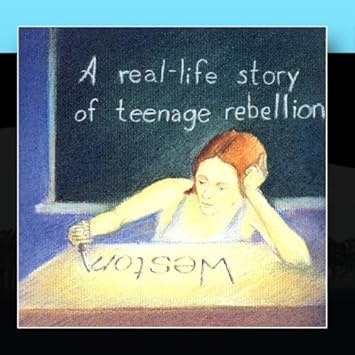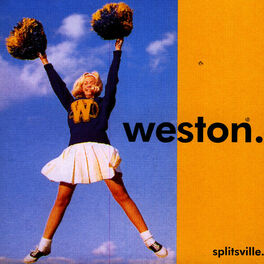Additional Info:
The band started out as a 5-piece post-hardcore act with some melodic leanings in 1990. After some time refining a sound and a live show, the band released the Thursdaytown 1981 7" in 1992. They gained a strong local reputation around this time and in the years to follow for their wildly energetic and often unpredictably goofy live shows. Vocalist Dave Weston would often perform in his underwear. Guitarist Mark Kale parted ways with the group to form a new band known as The ICK with Tom P of Slingshot Dakota. To keep their full sound, they recruited James Snyder for 2nd guitar and backup vocals. Even early on, Weston did not handle all lead vocals, some songs featured vocals by bassist Chuck Saltern, who was developing his own songwriting style that was complementary to Weston's. The band made sparing use of harmonies between the two, which would greatly increase with the addition of Snyder.
Following the lineup change, the band recorded and released a handful of split 7"s with area bands and signed with Gern Blandsten Records for their first LP release in 1994. Entitled A Real Life Story of Teenage Rebellion, the record showed the band's shift to a decidedly more pop-punk sound with lyrics that matched the theme hinted at in the title. Two tracks from the Thursdaytown 1981 EP reappeared on the album, much tighter and polished. Weston and Saltern shared almost equal time as lead vocalist, and the vocal harmonies greatly increased, becoming one of the band's strongest qualities. Following the release of the album, guitarist Chris Benner quit the group to form his own band, Digger, and Weston took over his spot on guitar rather than find a replacement. The band released a single of new material and a collection of vinyl-only tracks entitled Splitsville before parting with Gern and heading to Go Kart Records.
The band arguably enjoyed their highest level of success while on Go Kart. In 1996, they released Got Beat Up, considered by many fans to be their best work. Jim Snyder took on a much more prominent role for this record, contributing lead vocals to about 2/3 of the album. Weston and Saltern switched for the others, and at many times all took part in three part harmony. They even began adding more harmonies to older songs as part of their live show. This quality set the band apart from most in the genre. The pop-punk boom in the mainstream at the time (due to bands like Green Day and Rancid) combined with the band's rising friends and contemporaries the Bouncing Souls and Lifetime put a good deal of attention on Weston. They became well known in the PA/NJ/NY tri-state area and enjoyed a modest amount of success. There were rumors of major label offers, but the band chose to remain on indie Go Kart. In the midst of all of this, founding member and bassist/vocalist Chuck Saltern left the band. Prior to leaving, he helped to write and record two new songs for a split single with Digger. To many fans, this essentially ended the band they knew as Weston. He was replaced by Jesse Short, a friend from fellow Lehigh Valley band Walter Krug. This new lineup would last until the end of the band.
With Short in tow, the band recorded their next LP, Matinee. It contained re-recordings of both songs from the Digger split, as well as nine new tracks. Most noticeably, Snyder had taken over nearly all lead vocals, leaving Weston with just one song and one for newcomer Short. The album had a near-linear story and was meant to unfold like the plot of a movie, as evidenced by the projector sounds bookending the music and the liner notes arranged like a script. The band's sense of humor was still very present in the liner notes, but the music began to take a more serious turn, which disappointed some longtime fans. Many new fans were enjoying this sound, though, and the band's popularity continued to rise.
Left in record label limbo, the band chose Australian-based Rubber Records for their follow-up LP. Without any North American distribution, the Return to Mono album was near impossible for most fans to find as it was only available in Japan. A single was released for the tribute song "Liz Phair" which was featured in EA's 1999 video game, Street Sk8er, and "Bus Stop" appeared in demo form on a local PA compilation. Their live shows were tighter and more professional than ever, though still retaining some of the old silliness, but the songs were mostly unknown due to the record's unavailability and the band's popularity quickly waned.
In 1999, the band signed with Mojo Records, a subsidiary of Universal. They released a 7" as a teaser, containing demos of two brand new Snyder-penned songs. They were very similar in sound to the Pixies, a transition in sound the band had been slowly making since Matinee. Their final LP, The Massed Albert Sounds was released on Mojo in 2000. It contained re-recordings of several songs from Return to Mono, including the tracks "Radio" and "Liz Phair", which had already appeared on both the previous album and Matinee. For the tour and live shows following the album's release, a third guitarist (Jeff Kish of Greensburg, PA band Dawson High) and keyboardist (Jason Adams) were brought along to reproduce sounds on the album the band could not replicate as a four-piece. Massed Albert was seen by many as a chance to return the band to a local and national spotlight, but it did neither and the band split up the following year with little fanfare, playing their final show February 9 at the Pontiac Grille in Philadelphia.
We're looking for former band members who can provide information to build this page.
If you were a member of this band, please contact us at archive@mediafiveent.com or send us pertinent information and pictures, videos or mp3s of your band. Accepted materials and verified information will be posted.
|





:format(jpeg):mode_rgb():quality(40)/discogs-images/R-1262692-1577138020-3004.jpeg.jpg)

:format(jpeg):mode_rgb():quality(90)/discogs-images/R-1991758-1373679846-4897.jpeg.jpg)
